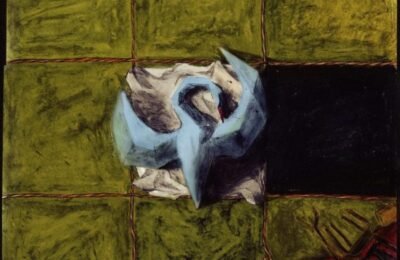The listener might recognize the melody, but not the words. “Uzan, dokun” roughly translates to “Reach out, touch faith” in Turkish. Yes, it is indeed Personal Jesus—but how did Depeche Mode’s iconic cold, mechanical grooves evolve into a version drenched in Middle Eastern psychedelia?
Bellier’s Musical Journey: From Stoner to “Arabia Fuzz”
Even for those familiar with Thomas Attar Bellier’s musical journey, the opening track of Al-Qasar’s latest album is unexpected—though not for the reasons one might think. Since his early days with Blaak Heat Shujaa (originally just Blaak Heat), Bellier’s work has been deeply influenced by North African and Middle Eastern sounds. Yet, while these influences were evident, they were often part of the psychedelic stoner scene typical of the 2010s, with bands like Om inspiring similar riffs laced with “Oriental” spices. But in 2016, Bellier’s Shifting Mirror album hinted at a new direction.
The Shift to Middle Eastern Influences
Shifting Mirror was a departure from Blaak Heat’s heavy, riff-based stoner music, shifting focus toward the minor scales of Middle Eastern music. With track titles referencing a vast cultural and religious history—from Morocco to Arabia (such as Tamazgha, Anatolia, Taqsim, and The Approach to Al-Mu’Tasim)—and a cover of the Afghan classic “Mola Mamad Djan,” the album felt closer to Secret Chiefs 3 or Ishraqiyun than Om. Bellier’s final single, Arabian Fuzz, further solidified his shift, introducing an Arab-speaking vocalist, Fareed Al-Madain. This marked the end of Blaak Heat and the birth of Al-Qasar—a band committed to “Arabia fuzz.”
Unveiling Al-Qasar’s Vision with Who Are We?
Following their first EP, Miraj (2020), Al-Qasar’s debut album, Who Are We?, revealed Bellier’s overarching vision: uniting modern Western alternative music with contemporary Middle Eastern sounds. Who Are We? featured contributions from indie legends like Lee Ranaldo and Jello Biafra, alongside key figures from the Muslim world, such as Sudanese singer Alsarah, oud virtuoso Mehdi Haddab, and Egyptian folk singer Hend Elrawy.
Uncovered: Expanding the Fusion of Cultures
Al-Qasar’s latest record, Uncovered, builds on the foundation laid by previous releases. The album includes four covers: two from Western music (Kişisel İsa, the Turkish version of Depeche Mode’s Personal Jesus, and Ssir W Ztam, the Arabic rendition of Sean Paul’s Get Busy), and two from the Eastern canon (Desse Barama, originally by Nubian singer and oud player Hamza El Din, and Bissaha Tlaqayna, a classic Lebanese song).
A Diverse and Cohesive Sound
As with past projects, Bellier enlisted an international lineup of artists, including Turkish singer Sibel, Sudanese artist Alsarah (who returns from Who Are We?), Tunisian oud player Nada Mahmoud, Moroccan singer Sami Galbi, Malian musicians Mamani Keita and keyboardist Cheick Tidiane Seck, and more.
What stands out about Uncovered is its ability to weave a diverse range of influences into a cohesive whole. Despite drawing from varied genres—British synth-rock, Jamaican dancehall, contemplative oud-based instrumentals (Blue Tataouine), and spoken word (Enyio Nkondon)—the album maintains a seamless flow. It consistently surprises and captivates the listener, while preserving its unique identity.
Uncovered: A Window into Modern Music Scenes
In recent years, musicians from Africa and the Middle East—such as Tinariwen, Mdou Moctar, Noura Mint Seymali, and Mohammad Syfkhan—have gained recognition in Western markets without being pigeonholed into the “world music” category. Albums like Uncovered further blur the lines, offering a window into modern music scenes that are just as innovative and captivating as the typical American or British indie scene. This makes Uncovered not just a brilliant album, but a significant and precious one in today’s global music landscape.


















